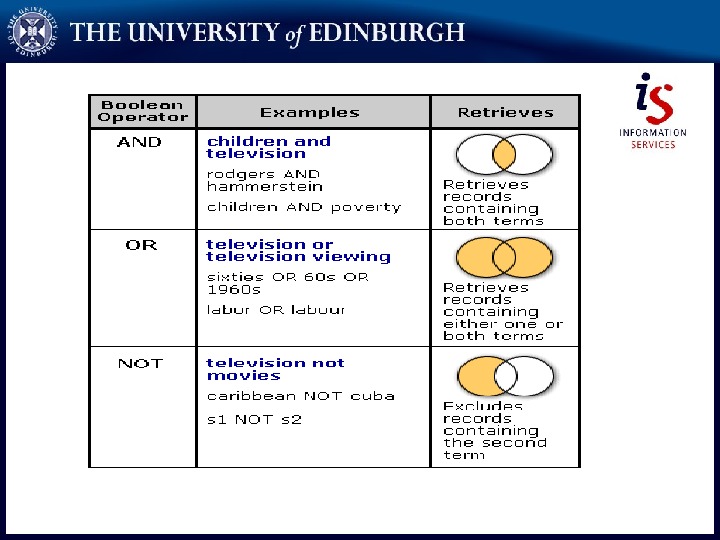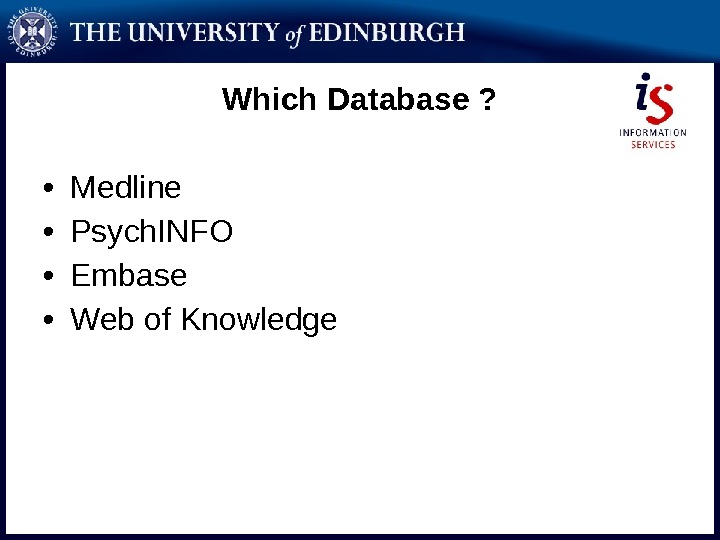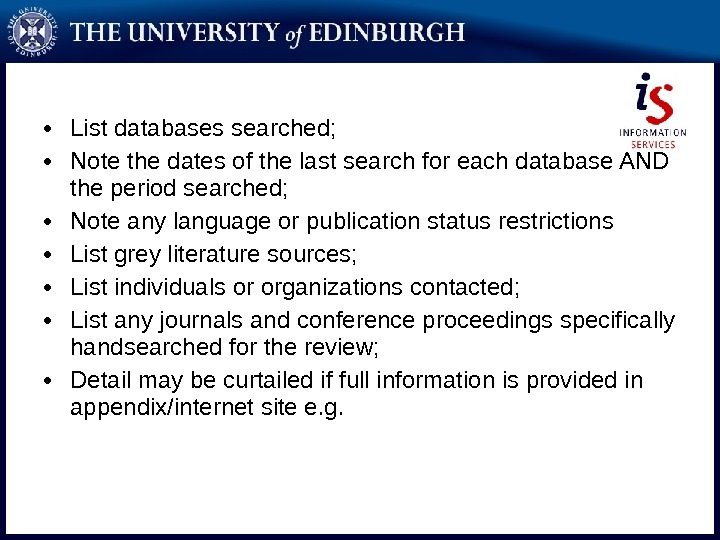SYSTEMATIC LITERATURE SEARCHING Sheila Fisken University of Edinburgh






























systematic_literature_searching.ppt
- Размер: 720.5 Кб
- Количество слайдов: 30
Описание презентации SYSTEMATIC LITERATURE SEARCHING Sheila Fisken University of Edinburgh по слайдам
 SYSTEMATIC LITERATURE SEARCHING Sheila Fisken University of Edinburgh
SYSTEMATIC LITERATURE SEARCHING Sheila Fisken University of Edinburgh
 The literature searching process • “ is not an exact science but an art. ” Samuel Butler Try to think of the process as a • ‘ journey not a destination’ Hearst
The literature searching process • “ is not an exact science but an art. ” Samuel Butler Try to think of the process as a • ‘ journey not a destination’ Hearst

 • Steps in the Review Process • Defining and refining the research question • Divide into concepts (PICO) • Think about synonyms of key concepts • Think of best combination of concepts • Identify resources • Test strategy • Revise strategy • Re-test strategy • Adapt strategy for different databases
• Steps in the Review Process • Defining and refining the research question • Divide into concepts (PICO) • Think about synonyms of key concepts • Think of best combination of concepts • Identify resources • Test strategy • Revise strategy • Re-test strategy • Adapt strategy for different databases
 For this lecture we will be using the research question for searching demonstrations. • What is the effectiveness of Cognitive Behaviour Therapy in Chronic Fatigue Syndrome?
For this lecture we will be using the research question for searching demonstrations. • What is the effectiveness of Cognitive Behaviour Therapy in Chronic Fatigue Syndrome?
 GETTING STARTED • Is there a recent review in your research area ? • Check out Cochrane • Check out Medline using the Basic Search • Check out Google and Google Scholar
GETTING STARTED • Is there a recent review in your research area ? • Check out Cochrane • Check out Medline using the Basic Search • Check out Google and Google Scholar
 • Click on the links for video screenshots • How to find Database List • Quick Cochrane Search • Basic Medline Search
• Click on the links for video screenshots • How to find Database List • Quick Cochrane Search • Basic Medline Search
 Pearl Growing • From one relevant article you can use Footnote Chasing and Citation searching to identify other key papers, relevant Me. SH terms and keywords. Cognitive behavior therapy for chronic fatigue syndrome: a multi centre randomised controlled trial. Lancet 2001, 357, 841 -847 Prins JB et al
Pearl Growing • From one relevant article you can use Footnote Chasing and Citation searching to identify other key papers, relevant Me. SH terms and keywords. Cognitive behavior therapy for chronic fatigue syndrome: a multi centre randomised controlled trial. Lancet 2001, 357, 841 -847 Prins JB et al
 • Find Web of Science in the A-Z list • Web of Knowledge Cited Ref Search
• Find Web of Science in the A-Z list • Web of Knowledge Cited Ref Search



 • What is the effectiveness of Cognitive Behaviour Therapy in Chronic Fatigue Syndrome? • P : Patients with Chronic Fatigue Syndrome • I : Cognitive Behaviour Therapy • C: Otherapies or Placebo ? • O: Reduced symptoms ?
• What is the effectiveness of Cognitive Behaviour Therapy in Chronic Fatigue Syndrome? • P : Patients with Chronic Fatigue Syndrome • I : Cognitive Behaviour Therapy • C: Otherapies or Placebo ? • O: Reduced symptoms ?
 Think of synonyms, alternative spellings and truncation possibilities. • CBT. Behavior/Behaviour Therap* • Chronic Fatigue Syndrome, CFS, ME, Post-viral fatigue syndrome* Limits: Adults, Humans, 1990 -2011 Study design: Trial, randomised controlled trial, systematic review, observational study.
Think of synonyms, alternative spellings and truncation possibilities. • CBT. Behavior/Behaviour Therap* • Chronic Fatigue Syndrome, CFS, ME, Post-viral fatigue syndrome* Limits: Adults, Humans, 1990 -2011 Study design: Trial, randomised controlled trial, systematic review, observational study.


 • Use the database specific indexing eg Medline Me. SH and EMTREE (Embase) and remember that they may differ. • Use textwords with variants and synonyms • Truncation • Wildcards e. g. behavio? r • Adjacency searching e. g cognitive adj 3 therap* • Field limits e. g. trial. ti, ab • Publication types
• Use the database specific indexing eg Medline Me. SH and EMTREE (Embase) and remember that they may differ. • Use textwords with variants and synonyms • Truncation • Wildcards e. g. behavio? r • Adjacency searching e. g cognitive adj 3 therap* • Field limits e. g. trial. ti, ab • Publication types
 Which Database ? • Medline • Psych. INFO • Embase • Web of Knowledge
Which Database ? • Medline • Psych. INFO • Embase • Web of Knowledge
 • Medline • Why use it? • Good coverage of wide range of clinical medical topics • One of the longest periods of coverage: from 1966, with over 15 million records • Very strong and widely recognised controlled thesaurus of Me. SH (Medline Subject Headings) for good relevancy of results. Transparent navigation of Me. SH terms allows searcher to ‘see inside’ the organisation of the database • Ovid interface has excellent search refining tools, and several save options including auto-alert • Bear in mind. . . • Long indexing delay: 3 to 6 months for complete records (Pre-medline helps to overcome this) • Very large: over 11 million records, so requires sifting through results • Of the biomedical, science and social science databases one of the weaker ones for psychiatry and psychology • Journal coverage weighted toward North American titles • Does not usually index publications other than journal articles Dozier, M (2011)
• Medline • Why use it? • Good coverage of wide range of clinical medical topics • One of the longest periods of coverage: from 1966, with over 15 million records • Very strong and widely recognised controlled thesaurus of Me. SH (Medline Subject Headings) for good relevancy of results. Transparent navigation of Me. SH terms allows searcher to ‘see inside’ the organisation of the database • Ovid interface has excellent search refining tools, and several save options including auto-alert • Bear in mind. . . • Long indexing delay: 3 to 6 months for complete records (Pre-medline helps to overcome this) • Very large: over 11 million records, so requires sifting through results • Of the biomedical, science and social science databases one of the weaker ones for psychiatry and psychology • Journal coverage weighted toward North American titles • Does not usually index publications other than journal articles Dozier, M (2011)
 • EMBASE Why use it? • Good coverage of wide range of clinical medical topics, but particularly strong in pharmacology and psychiatry when compared with Medline. • Good European journal coverage • Well structured controlled thesaurus (Emtree) for good relevancy of results • In addition to journal articles, covers meetings, conferences and symposia • Shorter Indexing delay than Medline: 4 to 8 weeks • BUT • Coverage: 1980 to present
• EMBASE Why use it? • Good coverage of wide range of clinical medical topics, but particularly strong in pharmacology and psychiatry when compared with Medline. • Good European journal coverage • Well structured controlled thesaurus (Emtree) for good relevancy of results • In addition to journal articles, covers meetings, conferences and symposia • Shorter Indexing delay than Medline: 4 to 8 weeks • BUT • Coverage: 1980 to present
 • Psyc. INFO Why use it? • Coverage back to 1887 • Well structured controlled thesaurus • Indexes more than just journal articles: dissertations and books, including book chapters • Good for all aspects of mental health • Good for social, behavioural and psychological aspects of health and illness • BUT • Comparatively small database: approximately 1. 5 million records
• Psyc. INFO Why use it? • Coverage back to 1887 • Well structured controlled thesaurus • Indexes more than just journal articles: dissertations and books, including book chapters • Good for all aspects of mental health • Good for social, behavioural and psychological aspects of health and illness • BUT • Comparatively small database: approximately 1. 5 million records
 • AMED (Allied and Alternative Medicine) • Why use it? • Subjects covered include acupuncture, homeopathy, palliative care, Chinese medicine, hospice care, physiotherapy, chiropractic, hypnosis, podiatry, herbalism, occupational therapy, rehabilitation, holistic treatments and osteopathy. • Controlled thesaurus terms (based on Me. SH) are used • BUT • Updated quarterly • Not all subjects have been covered since 1985: palliative care is since 1997, speech and language therapy since 1999. • Coverage: 1985 to present • Number of journals indexed: nearly 600 (mostly European journals)
• AMED (Allied and Alternative Medicine) • Why use it? • Subjects covered include acupuncture, homeopathy, palliative care, Chinese medicine, hospice care, physiotherapy, chiropractic, hypnosis, podiatry, herbalism, occupational therapy, rehabilitation, holistic treatments and osteopathy. • Controlled thesaurus terms (based on Me. SH) are used • BUT • Updated quarterly • Not all subjects have been covered since 1985: palliative care is since 1997, speech and language therapy since 1999. • Coverage: 1985 to present • Number of journals indexed: nearly 600 (mostly European journals)
 • VIDEOSCREENCAST OF a Medline Search using Mesh headings Medline search
• VIDEOSCREENCAST OF a Medline Search using Mesh headings Medline search
 • Savoie et al (2000) estimated that 29. 2% of items in their review were uncovered by: – searching the web – handsearching – scanning reference lists – personal communication – searching specialised databases and web sites. • Wallace et al. – 11 of 65 trials (17%) in end stage renal disease reviews were found by searching beyond major databases.
• Savoie et al (2000) estimated that 29. 2% of items in their review were uncovered by: – searching the web – handsearching – scanning reference lists – personal communication – searching specialised databases and web sites. • Wallace et al. – 11 of 65 trials (17%) in end stage renal disease reviews were found by searching beyond major databases.
 • Beyond the Databases • Long lead times before publication: – publication gaps after conference presentation • Cheng et al (1998) – Only 8. 1% of a set of conference papers achieved publication within 12 months, 40% within 5 years • Hopewell et al (2007) Cochrane review – trials with positive results are published sooner than other trials – indexing lag – between publication and recording in databases
• Beyond the Databases • Long lead times before publication: – publication gaps after conference presentation • Cheng et al (1998) – Only 8. 1% of a set of conference papers achieved publication within 12 months, 40% within 5 years • Hopewell et al (2007) Cochrane review – trials with positive results are published sooner than other trials – indexing lag – between publication and recording in databases
 • Egger M et al (2003) How important are comprehensive literature searches and the assessment of trial quality in systematic reviews? Empirical study. – Assesses effect of non-English studies, grey literature and non-MEDLINE recorded studies on the effects of meta-analyses of SRs of more than 5 RCTs. – Suggests that with limited resources, fewer sources might be searched without compromising efforts to reduce bias – Recommends adequate quality assessment of studies before inclusion in reviews – Does not assess the quality of the searching employed by review teams • Generated ongoing debate
• Egger M et al (2003) How important are comprehensive literature searches and the assessment of trial quality in systematic reviews? Empirical study. – Assesses effect of non-English studies, grey literature and non-MEDLINE recorded studies on the effects of meta-analyses of SRs of more than 5 RCTs. – Suggests that with limited resources, fewer sources might be searched without compromising efforts to reduce bias – Recommends adequate quality assessment of studies before inclusion in reviews – Does not assess the quality of the searching employed by review teams • Generated ongoing debate
 • List databases searched; • Note the dates of the last search for each database AND the period searched; • Note any language or publication status restrictions • List grey literature sources; • List individuals or organizations contacted; • List any journals and conference proceedings specifically handsearched for the review; • Detail may be curtailed if full information is provided in appendix/internet site e. g.
• List databases searched; • Note the dates of the last search for each database AND the period searched; • Note any language or publication status restrictions • List grey literature sources; • List individuals or organizations contacted; • List any journals and conference proceedings specifically handsearched for the review; • Detail may be curtailed if full information is provided in appendix/internet site e. g.
 Top Tips • Keep notes of searches and results • Scope and Re-Scope • Test and Re-Test- gold standard • Avoid ‘scope creep’ (Booth 2011) • Accept the ‘point of diminishing returns’ • Know when to STOP • Searching is never fully transparent, nor reproducible but make it Rigorous.
Top Tips • Keep notes of searches and results • Scope and Re-Scope • Test and Re-Test- gold standard • Avoid ‘scope creep’ (Booth 2011) • Accept the ‘point of diminishing returns’ • Know when to STOP • Searching is never fully transparent, nor reproducible but make it Rigorous.
 Enjoy the journey and If you need any help and advice on the way then email me @ Sheila. Fisken@ed. ac. uk
Enjoy the journey and If you need any help and advice on the way then email me @ Sheila. Fisken@ed. ac. uk
 References: Booth A. ‘Unpacking your literature search toolbox: on search styles and tactics’. Health Information and Libraries Journal 2008; 25(4): 313 -7. Cheng, K. , C. Preston, et al. (1998). «Time to publication as full reports of abstracts of randomized controlled trials in cystic fibrosis. » Pediatric Pulmonology 26 (2): 101 -105. Cochrane Collaboration. Cochrane handbook for systematic reviews of interventions http: //www. cochrane-handbook. org/ Centre for Reviews and Dissemination. Undertaking systematic reviews of research on effectiveness: CRD’s guidance for those carrying out or commissioning reviews http: //www. york. ac. uk/inst/crd/report 4. htm Dozier, M. (2011) Searching the Literature Systematically. Egger, M. , P. Juni, et al. (2003). «How important are comprehensive literature searches and the assessment of trial quality in systematic reviews? Empirical study. » Health Technology Assessment 7 (1): 1 -76. Hopewell S, Mc. Donald S, Clarke MJ, Egger M. Grey literature in meta-analyses of randomized trials of health care interventions. Cochrane Database of Systematic Reviews 2007, Issue 2. Art. No. : MR 000010. DOI: 10. 1002/14651858. MR 000010. pub 3. Khan K S, Kunz R, Kleijnen J, Antes G Systematic Reviews to support Evidence Based Medicine London: Hodder Arnold 2011 Savoie, I. , D. Helmer, et al. (2003). Beyond Medline: reducing bias through extended systematic review search. International Journal of Technology Assessment in Health Care 19 (1): 168 -78.
References: Booth A. ‘Unpacking your literature search toolbox: on search styles and tactics’. Health Information and Libraries Journal 2008; 25(4): 313 -7. Cheng, K. , C. Preston, et al. (1998). «Time to publication as full reports of abstracts of randomized controlled trials in cystic fibrosis. » Pediatric Pulmonology 26 (2): 101 -105. Cochrane Collaboration. Cochrane handbook for systematic reviews of interventions http: //www. cochrane-handbook. org/ Centre for Reviews and Dissemination. Undertaking systematic reviews of research on effectiveness: CRD’s guidance for those carrying out or commissioning reviews http: //www. york. ac. uk/inst/crd/report 4. htm Dozier, M. (2011) Searching the Literature Systematically. Egger, M. , P. Juni, et al. (2003). «How important are comprehensive literature searches and the assessment of trial quality in systematic reviews? Empirical study. » Health Technology Assessment 7 (1): 1 -76. Hopewell S, Mc. Donald S, Clarke MJ, Egger M. Grey literature in meta-analyses of randomized trials of health care interventions. Cochrane Database of Systematic Reviews 2007, Issue 2. Art. No. : MR 000010. DOI: 10. 1002/14651858. MR 000010. pub 3. Khan K S, Kunz R, Kleijnen J, Antes G Systematic Reviews to support Evidence Based Medicine London: Hodder Arnold 2011 Savoie, I. , D. Helmer, et al. (2003). Beyond Medline: reducing bias through extended systematic review search. International Journal of Technology Assessment in Health Care 19 (1): 168 -78.
